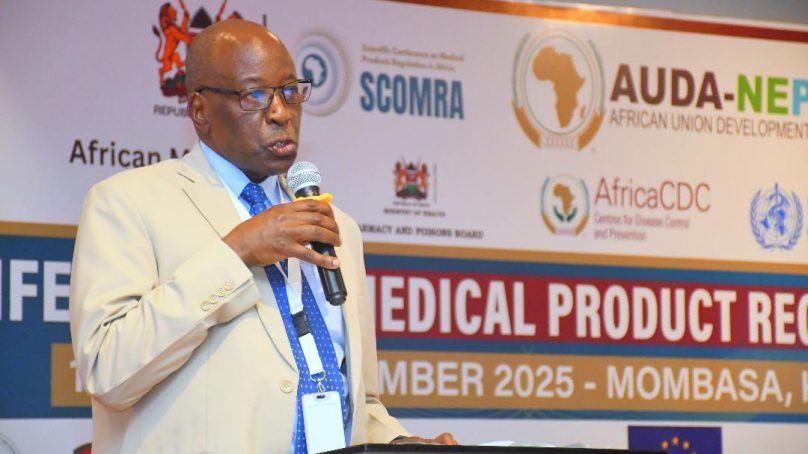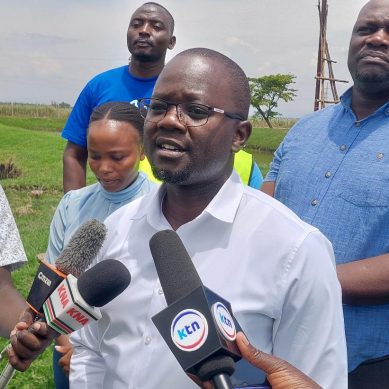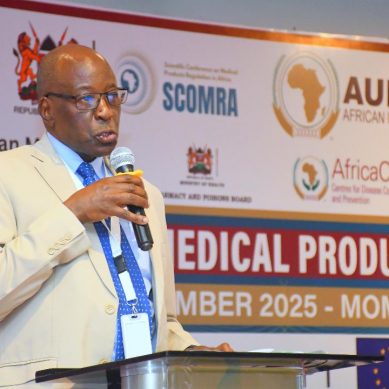
Africa is counting on Africa Medicines Agency (AMA) to drive regulatory harmonisation in the medical sector, spur local manufacturing and reduce dependence on imported health products to strengthen the continent’s preparedness and response to public health emergencies.
Speaking in Mombasa during the 7th Biennial Scientific Conference on Medical Products Regulation in Africa (SCoMRA), Chair of Pharmacy and Poisons Board John Munyu said that Africa imports over 90 per cent of its medicines, while less than one per cent of vaccines are produced locally, a vulnerability that was exposed during the Coid-19 pandemic.
The conference, held under the theme “Regulatory Harmonisation: Unlocking Africa’s Potential in Health Product Manufacturing and Trade”, seeks to strengthen regulatory oversight to attract and sustain local manufacturing investments.
Dr Munyu underlined Kenya’s commitment to harmonising regulatory frameworks, noting that medical officers have been deployed to spearhead the country’s efforts.
“We are fully engaged and actively participating alongside other partner states on the continent,” he said.
For over a decade, he noted, the African Medicines Regulatory Harmonisation (AMRH), which is now transitioning to AMA, has been instrumental in building a robust regulatory system from the national to the regional levels.
He lauded the significant strides that have been made, including the harmonisation of regulatory guidelines across Regional Economic Communities and the digitalisation of regulatory processes.
“This foundation has paved the way for a historic leap forward: the operationalisation of the African Medicines Agency (AMA), headquartered in Kigali.”
Munyu described the Agency as the embodiment of a shared African vision for a self-reliant, resilient continent capable of safeguarding the health of its people.
“We are here to ensure that the promise of the AMA is fully realised to catalyse local manufacturing, facilitate intra-African trade under the AfCFTA and guarantee that quality, safe and efficacious medical products reach every African in need,” Munyu said.
AMA Director General Delese Darko explained that the continental regulatory agency was established by an African Union treaty. She expounded that the idea of AMA is for a continental agency regulatory agency for Africa, akin to the European Medicines Agency.
“That means that you can submit one application. You will have one review and you have one decision that the whole of Africa can take. It means that if you have a medicine that you want available to the whole of Africa. It can be done faster. It means faster access to medicines,” Darko stated.
She recalled that during the coronavirus pandemic, it took a long time for Africans to get access to Covid-19 vaccines, but with AMA in place, African nations can now access medicines faster.
“AMA is also established to ensure that the local industry can thrive in Africa. We will coordinate the manufacture of complex products in Africa, vaccines, what we call monoclonal antibodies, medical devices, to be able to test for monkey-pox, Covid and all sorts of complex diseases that we could not in the past,” she said.
To actualise the vision, African Union member states were urged to sign the AMA treaty, as only 31 member-states have signed the treaty, with 24 remaining.
“I am using this platform to appeal to the remaining 24 member-states to sign the treaty. So that all the 55 member states can come on board to have a unified Africa. When we make a decision, all the member states can take that decision and use it in their regulatory agencies,” she appealed.
She further explained that a decision or a review made by AMA will not be forced on a nation, but nations will still enjoy the sovereignty to use the decision.
Director of Human Capital Development at the African Union Development Agency, Symerre, emphasised that the three-day conference will ensure local manufacturing and intra-African trade in medical products become a reality.
“If we have a robust framework, we should be able to ensure that Africa will become not only a manufacturer, but also an exporter and this you can only do if you have a robust continental supranational agency,” he stated.
- A Tell Media / KNA report / By Sadik Hassan







